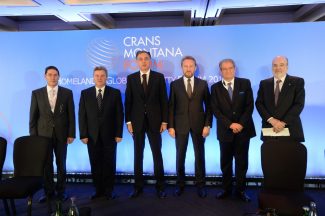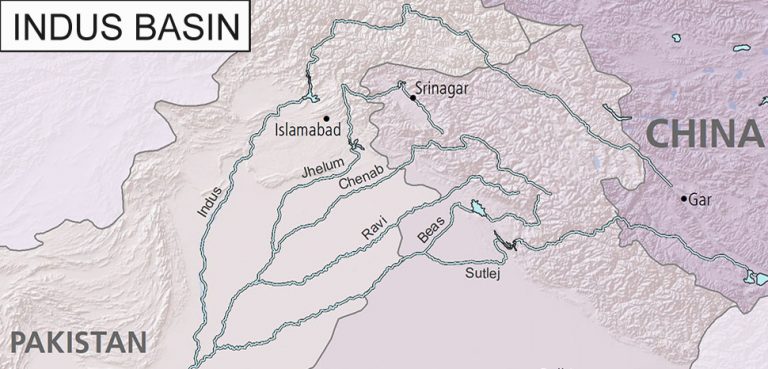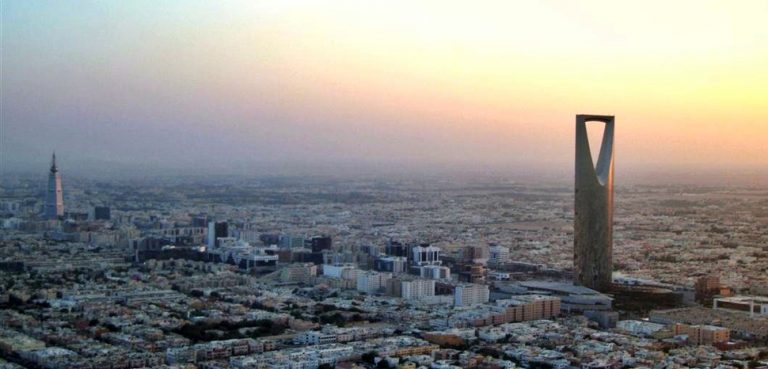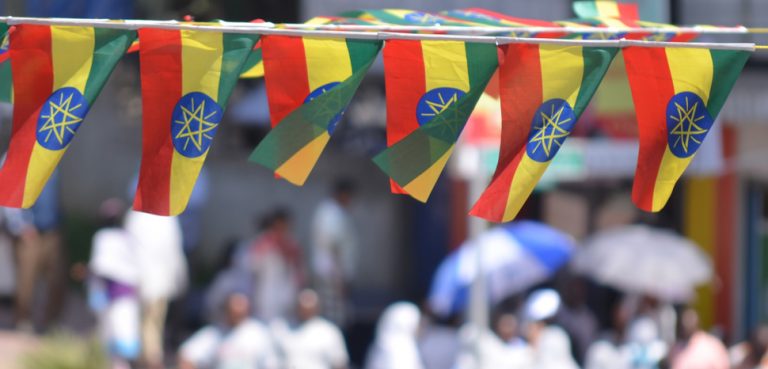Geopoliticalmonitor.com’s Europe-based Director of Political and Business Risk reports from the Crans Montana Forum’s Homeland and Global Security Forum, held in Geneva, Switzerland (October 15-17, 2014).
The Crans Montana Forum’s (CMF) Homeland and Global Security Forum (HGSF) was held in Geneva, Switzerland from October 15-17, 2014. The Crans Montana Forum is a Swiss international organization that works for the promotion of international cooperation and aims to contribute to global growth while ensuring a high level of stability, equality, and security. The CMF aims to foster best practices and to ensure global dialogue on issues and challenges that pose the greatest threat to international peace, good governance, business climate, health, and security. Since 1986 the CMF has sought to foster international cooperation and past speakers and participants include: US Ambassador to the United Nations Richard Holbrooke, former President of the USSR Mikhail Gorbachev, and President Yasser Arafat.
This year’s HGSF took place over three days and focused on topics including empowering African women, education, global security challenges, risk management and corruption, insecurity in the Sahel, Ebola, counterterrorism, Islamic State, maritime security, and the future of the Balkans in NATO and the EU.
The New Threat is Unpredictability
The first session on October 16 focused on the greatest global security challenges we face today. This high-level panel included Ted Whiteside (Dep. Assistant Secretary General for Public Diplomacy, NATO), Alexey Borodavkin (Russian Ambassador to the United Nations), Stephan Husy, Ambassador-at-Large for Counter-Terrorism, Switzerland, Stephen O’Brien, UK Prime Minister’s Special Representative to the Sahel, and several others. The panel was chaired by CMF founder Ambassador Jean-Paul Carteron.
Ted Whiteside stressed the importance of countering unpredictability and the transformative veil of NATO. He further stated that NATO’s counter-piracy actions in the Gulf of Aden had been very effective in stemming unpredictability on the high seas and that NATO was attempting to become more transparent. He further expressed that NATO was not a “global cop” and that the organizations mandate and members limited the organization’s ability to get involved in every global conflict. During his presentation, Mr. Whiteside also criticized Russia for meddling in the internal affairs of Ukraine and urged Russia to be a more responsible global actor.
In response to Mr. Whiteside’s intervention, Russian Ambassador to the United Nations Alexey Borodavkin stressed that the conflict in Ukraine was an internal civil conflict and that the Russian-speaking peoples of Eastern Ukraine were well within their rights to fight against the “ultra-nationalists” that had seized power “illegally” in Kiev. Ambassador Borodavkin also stated that unpredictability and chaos can only give birth to radicalism and terrorism, and that terrorism was the greatest global security threat we face today. He further reiterated Moscow’s support for the Al-Assad regime in its fight against ISIS and criticized NATO and the West for interventions in Libya that changed balances of power and led to greater instability and radicalism in the region.
Risk Management and Corruption
The CMF session on risk management and corruption was held on October 16. This session feature William Bourdon (Chairman of SHERPA), Lahcen Haddad (Minister of Tourism for Morocco), Lech Paprzycki (President of the Supreme Court of Poland), Dieudonné Massi-Gams (Chairman, National Anti-Corruption Commission, Cameroon), Abdoulaye Thioye (Secretary General, CENTIF, Senegal), Tapiwa Uchizi Nyasulu (Regional Coordinator-Southern Africa, Transparency International) and others.
Dieudonné Massi-Gams spoke on the Cameroonian experience of fighting corruption. He emphasized the importance of tackling corruption through a National Strategy and stressed the significance of education at both primary and university levels. Dieudonne also reported that after the enactment of a national anti-corruption strategy, the state of Cameroon was able to increase revenue by $50 billion.
Tapiwa Uchizi Nyasulu, Regional Coordinator-Southern Africa for Transparency International focused her intervention on corruption in the arms, defence, and security trade. She stated that corruption was a multi-billion dollar industry in this sector. The Transparency International representative identified three reasons why corruption was so dangerous in this sector. They are: corruption undermines the military’s ability to procure the best quality equipment and this puts soldiers’ lives at risk; corruption is divisive and can exacerbate ethnic tension in the military and society at large; corruption is extremely wasteful and in nations with finite budgets undermines the ability of military to best protect its citizens. She further explained that corruption in the arms and defence sector can also make nations less safe as organized criminal and sometimes even terrorist organizations can be involved in the laundering of illicit funds on behalf of unscrupulous government and military officials.
The Sahel
The final session , which was organized in cooperation with the CMF-New Leaders for Tomorrow and UNESCO, was held on October 16 examined the growing instability in Africa’s Sahel-Saharan region. This panel was attended by Stephen O’Brien (UK Prime Minister’s Special Representative to the Sahel), Marie-Paule Roudil (The Head of UNESCO), Hassan Abouyoub, former Minister and Ambassador to Italy, Morocco, Bongnessan Arsène Yé, Minister of State for Relations with Parliament and Political Reforms of Burkina Faso, and multiple others. The panel was chaired by Daniel Warner, the chair of the CMF Advisory Board.
Panelists discussed the need to fight terrorism, Islamist extremism, and illicit trafficking in the region. Of note was the intervention made by Stephen O’Brien. O’Brien explained that the Sahelo-Saharan region was part of a “global band of instability” that spanned from Afghanistan in the East to Mali in the West. Mr. O’Brien also stated that the international community must act to prevent the five countries of the Sahel from becoming another Afghanistan. He further stated that the region faced serious economic, social, humanitarian, development and governance challenges and that such challenges had been made worst by radical jihadist and criminal groups that sought to exploit them for their own gains. He also spoke of the dissatisfaction of many young men in the region and that this was caused by a lack of opportunity and employment.
Ebola
The Friday October 17 session was held on the Ebola epidemic in West Africa and examined if the virus could pose a threat to global peace and security. This panel was attended by Philippe Douste Blazy (Under Secretary General of the United Nations), Benoit Miribel (Director General, Foundation Merieux, France), Raphael Slattery, Program Manager, Pandemics and Epidemics Department, World Health Organization, Thomas Nierle (President, Medecins sans Frontieres, Switzerland) Guy Zilberstein (Special Advisor to the President of France), Cellou Dalein Diallo (Former Prime Minister of Guinea), Aminata Touré, Former Prime Minister of Senegal, Sabine Ntakarutimana (Minister of Health, Burundi), Mano Aghali (Minister of Public Health, Niger), Awa Marie Coll Seck (Minister of Health & Social Welfare, Senegal), and multiple other African Government Representatives and technical medical experts.
All panelists stressed the need for greater international cooperation on the Ebola issue and stated that the responses and funding were inadequate to address an issue of this scale. Speakers also discussed the economic impact of the virus which if continues to spread at the current rate would be approximately $25 billion in Sierra Leone alone. The speakers also stressed that the virus could lead to grave food insecurity, failed states and conflict in the region if Ebola was not brought under control.
During the Q&A part of this session the UN Ambassador to Sierra Leone made an emotional plea to the international community to do more. She emphasized that Ebola was not a regional issue but a global one and that if swift action was not taken the number of cases globally could double by 2015.
The recommendations that came out of this session were as follows: greater international cooperation, funding, and action; a vaccine must be part of the solution due to the sheer number of cases at this point; training for front-line staff must be improved using innovative techniques such as e-learning; long-term strategies to deal with epidemics like Ebola at the global level are inadequate and must be improved; borders must remain open to facilitate aid and medical supplies reaching the affected nations; public health infrastructure is key to containing Ebola; Ebola is not only a threat to human health but international peace and security, due to knock-on effects and the fact that the virus is a Class A Bio-terror threat; local virus mapping must be improved and greater political will is needed to defeat the virus.
The Rise of Islamic State, Counterterrorism in Iraq and Syria
The afternoon session on October 17th examined the question: Is the Middle East Condemned to Instability and War? It covered issues ranging from radicalism to Palestinian statehood. The speakers on this panel included Ahmed bin Mohammed Al Salem (Dep. Minister of Interior, Saudi Arabia), Ibrahim Khraishi (Ambassador to the UN, Palestine), Alain Juillet (Former Head of Intelligence, France) HRH Prince Sultan bin Khalid Al-Faisal (Captain – Royal Saudi Naval Forces, ret.), Leslie Wilmart Angelo (Senior Analyst, NATO) and Tahir Ali Al Wasfe (Secretary General, Peoples National Democratic Liberation Movement of Iraq).
Tahir Ali Al Wasfe spoke on the rise of ISIS and explained that the roots of the current crisis in Iraq dated back to the US occupation and the carving up of Iraq along ethnic lines. He stated that prior to the US invasion different ethnic and religious groups co-existed in peace in Iraq for centuries. He blamed US-imposed political and governance structures for inflaming ethnic and religious tensions in the country. He also explained how the current situation in Iraq and Syria had become a regional and even global proxy war and that foreign intervention had broken Iraq. He further stated that endemic corruption in Iraq had further exacerbated ethnic tensions. He also warned the West that ISIS was trying to draw them into a ground war in Iraq and Syria and that they should not fall for this.
The NATO representative Leslie Wilmart Angelo voiced her opinion that ISIS was a transnational threat that had compromised the territorial integrity of Iraq. She also stated that NATO members must work collectively to improve crisis management systems to combat terrorism. She concluded by focusing on the grim humanitarian picture in the Levant and illustrated this by explaining that there were 1.8 million Internally Displaced People in Iraq and that 70% of the Iraq’s people lacked access to clean water. Angelo also expressed the need for more to be done to assist Iraq’s and Syria’s neighbors who are hosting over 3 million refugees who have fled the fighting.
The Saudi representatives spoke passionately about how to counter radicalization and extremism while at the same time bolstering security. The Saudi officials spoke of a two-track approach to defeating radicalism at home. The first approach was to punish and eliminate those hardened radicals who had blood on their hands or who posed an immediate threat to national security. The second and more interesting approach was to identify, isolate, and de-radicalize the would-be jihadists. Ahmed bin Mohammed Al Salem (Dep. Minister of Interior, Saudi Arabia) stated that they had become very good at identifying the symptoms of radicalization and that would-be jihadists often became withdrawn and voiced incorrect and unconventional interpretations of Islam. Once these individuals were identified they were remanded into a state treatment center run by Dr. Alhadlaq. As part of their treatment they are re-educated by Islamic scholars, treated by mental health professionals and were given new employment opportunities in society after they were released. The Saudi representatives further stated that these individual’s families are also taken care of financially by the state and upon release from treatment they are given jobs and financial support to assist them reintegrate into society. This approach also gives incentives to families to report radicalization as they know they will be taken care of by the state. They also spoke about combating radicalism online through Islamic Scholarship and that nations must criminalize the act of going to fight jihad in Syria and Iraq as Saudi Arabia had done.
The Palestinian Ambassador to the UN stated that Palestinians needed statehood and that this would be the greatest weapon to countering terrorism and radicalism in the Middle East. He also condemned Israel’s disregard for international law and stated that “we cannot end terrorism without ending occupation.” He further reported that this summer’s conflict in Gaza had killed 2,200 Palestinians and destroyed 18,000 homes.
Securing Southeastern Europe
The final session on October 17 was attended by various high-level dignitaries including the Presidents of Montenegro (Filip Vujanovic) and Macedonia (Gjorge Ivanov), The Chairman of the Presidency of the Republic of Bosnia-Herzegovina (Bakir Izetbegovic) and the Former President of the Republic and Prime Minister of Albania (Sali Berisha) and was chaired by CMF founder and chairman Ambassador Jean-Paul Cateron. The speakers on this high-level panel focused on energy security and the integration of Balkan states into the EU and NATO. Both Presidents reiterated their desire to join the EU with full membership and clearly stated that NATO membership was a goal. The other panellists further explained the geopolitical importance of the region as an “energy crossroads” and why the region was strategically central to Europe’s energy security.
The president of Macedonia made compelling arguments as to why his nation deserved EU and NATO membership and explained that Macedonian troops had served 18 rotations in Afghanistan in support of the NATO ISAF Force. President Ivanov also expressed his dismay with Greece’s efforts to block Macedonia joining the EU and NATO. The long-running dispute between Macedonia and Greece relates to the use of the name Macedonia. Greece opposes the use of the name “Macedonia” by the Republic of Macedonia without a geographical qualifier, supporting a compound name such as “Northern Macedonia” for use by all and for all purposes. Greece maintains that they have historical rights to the name Macedonia and that the name should only be used to describe the Northern Region of Greece which is also named Macedonia. The president clearly stated that the right to self-identify was enshrined in international law and the UN Charter. And that despite the International Court of Justice’s ruling that the Republic of Macedonia was well within their rights to use the name Greece has still made every attempt to block the Republic of Macedonia’s accession to NATO and the EU.
In conclusion, the CMF has created an excellent and unique forum for heads of state, policy leaders, diplomats, government officials and civil society to engage with one another and find innovative solutions to help address the world’s most pressing challenges. We hope that many of the calls to action made at this year’s CMF are heeded and that by working collectively we as global citizens are able to resolve some of the world’s most critical challenges.
Geopoliticalmonitor.com, as a media partner of the Crans Montana Forum on this occasion, would like to thank them for hosting us at their 2014 event in Geneva.




